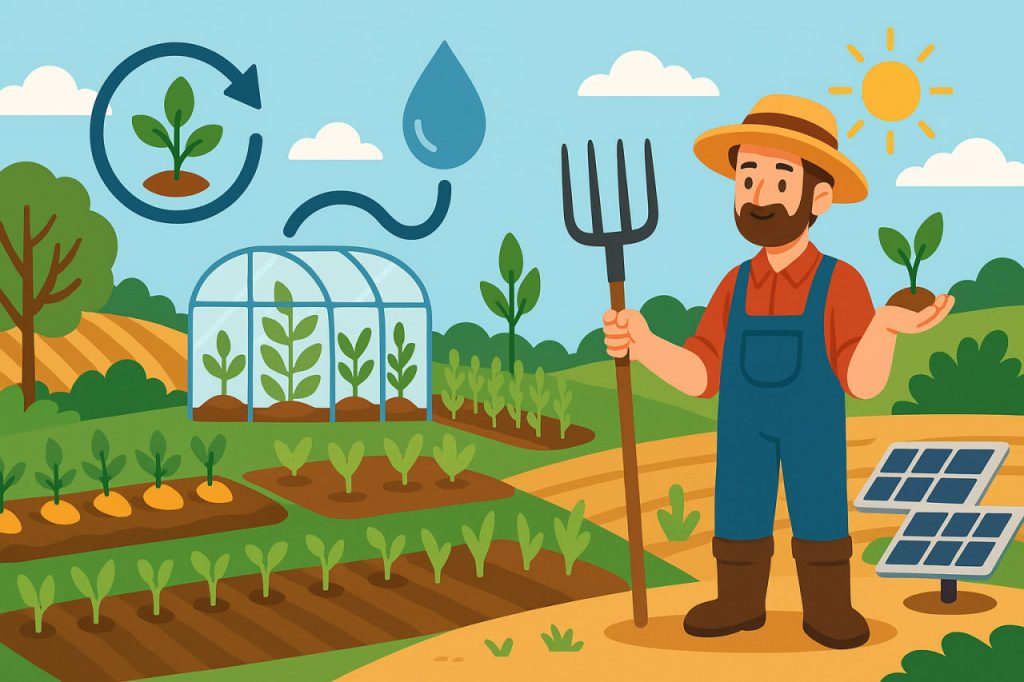Sustainable agriculture is a farming approach that aims to meet current food needs without compromising the ability of future generations to meet their own. It integrates environmental health, economic profitability, and social equity to ensure long-term agricultural productivity. Unlike conventional farming, which often relies heavily on chemical fertilizers, pesticides, and intensive land use, sustainable agriculture focuses on working with nature rather than against it. It seeks to reduce harm to ecosystems by improving soil health, conserving water, and minimizing pollution. Sustainable farming practices support biodiversity, enhance resilience to climate change, and promote the well-being of rural communities. This approach is not limited to organic farming but includes a broader range of practices that emphasize balance and regeneration. Ultimately, sustainable agriculture represents a shift from short-term yields to long-term stability and environmental stewardship.
Core Principles of Sustainable Agriculture
At the heart of sustainable agriculture are several guiding principles. The first is soil conservation, which includes techniques like crop rotation, cover cropping, and reduced tillage to maintain soil structure and fertility. A second principle is water management, where farmers use drip irrigation, rainwater harvesting, and careful scheduling to use water efficiently. The third principle is the reduction of external inputs such as synthetic chemicals, opting instead for compost, manure, and natural pest control methods. Farmers also aim to maintain or increase biodiversity on their land, using methods like agroforestry and intercropping. Ethical treatment of animals and fair labor practices are also important components. Many sustainable farms are small-scale and community-oriented, selling produce locally to reduce transportation emissions. These principles are interconnected, reinforcing each other to create a healthier, more resilient agricultural system.
Benefits to the Environment and Society
Sustainable agriculture offers broad environmental benefits. By reducing the use of toxic pesticides and fertilizers, it prevents the contamination of water bodies and supports pollinator populations like bees. Healthier soil stores more carbon, helping to fight climate change. It also increases the soil’s ability to retain water, which is crucial during droughts. Socially, sustainable farming strengthens local economies by encouraging community-supported agriculture (CSA) and farmers’ markets. It often preserves traditional farming knowledge and practices, blending them with modern techniques. These farms typically prioritize food quality and nutritional value over appearance and mass production. By shortening the food supply chain, sustainable agriculture reduces the need for packaging, refrigeration, and long-distance transport, lowering the overall environmental footprint. This holistic approach benefits both ecosystems and people.
Challenges and Future Outlook
Despite its advantages, sustainable agriculture faces several challenges. One is economic viability, as these methods may initially yield less than conventional farming, making profits harder to achieve without subsidies or local support. There is also a need for more research, policy support, and education to help farmers transition. In some regions, access to sustainable inputs like compost or organic seeds is limited. Climate change adds further complexity by increasing the unpredictability of weather patterns, pests, and disease. Nonetheless, innovations like regenerative agriculture, precision farming, and climate-smart technologies offer hope for broader adoption. Consumer demand for sustainably grown food is rising, encouraging supermarkets and policymakers to support eco-friendly practices. With coordinated global efforts, sustainable agriculture could become the new normal, ensuring food security and ecosystem balance for future generations.
Glossary
- Sustainable agriculture – farming that balances environmental, social, and economic concerns.
- Crop rotation – planting different crops in the same field across seasons to maintain soil fertility.
- Agroforestry – integrating trees and shrubs into crop and animal systems for ecological and economic benefits.
- Regenerative agriculture – a holistic land management practice that restores soil health and biodiversity.
- Climate-smart agriculture – farming methods designed to increase resilience to climate change.
- Intercropping – growing two or more crops together in the same field to maximize space and resources.


